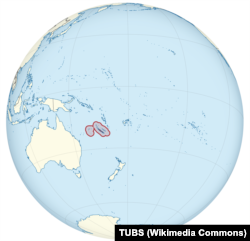Violence raged across New Caledonia for the third consecutive day Thursday, hours after France imposed a state of emergency in the French Pacific territory, boosting security forces’ powers to quell deadly unrest in the archipelago that has long sought independence.
French authorities in New Caledonia and the interior ministry in Paris reported that five people, including two police officers, have been killed in the violence after protests earlier this week over voting reforms pushed by President Emmanuel Macron’s government turned deadly.
At least 60 members of the security forces were injured, and 214 people were arrested in Thursday’s clashes with police, arson and looting, according to the territory’s top French official, High Commissioner Louis Le Franc.
“Everything is being done to restore order and calm that Caledonians deserve,” French Prime Minister Gabriel Attal said after Thursday’s security meeting at the Elysee presidential palace in Paris.
Attal said France will provide the island with essential goods after three days of unrest. In addition to the 1,700 security forces troops that have already been deployed to help police curb the violence, 1,000 more are on the way, he added.
The situation “remains very tense, with looting, riots, arson and attacks which are unbearable and unspeakable,” Attal said.
Two members of the island’s Indigenous Kanak community were among the five dead, French Interior and Overseas Territories Minister Gerald Darmanin said Thursday.
“The [French] state will regain total control,” Darmanin declared in a series of interviews with French media.
Darmanin said 10 people, all alleged members of the pro-independence movement known as the Field Acton Coordination Unit, have been placed under house arrest. In April, the group backed several protests against French authorities on the island.
However, Darmanin alleged on Thursday that the movement is a “small group which calls itself pro-independence, but instead commits looting, murder and violence.”
“We will not back down,” Darmanin said.
The National Council of Chiefs of the Indigenous Kanak people condemned “all acts of vandalism and gun violence” as “unjustifiable” but rejected the allegations that members of the Field Action Coordination Unit have been involved in the deadly violence.
Grand Chief Hippolyte Sinewami-Htamumu expressed full support for the pro-independence group, which has mobilized more than 100,000 people “of all ages and from all backgrounds” in peaceful protests in recent months in the capital, Noumea, and throughout the island.
“This is not a ‘terrorist group’ or ‘mafia group,’ as certain political leaders want us to believe,” he said in a statement on Thursday.
The state of emergency will be in place for at least 12 days, French Prime Minister Gabriel Attal said Wednesday.
French military forces were being deployed to protect ports and airports and to beef up security forces’ efforts to curb violence. The curfew has been extended until Friday morning, Le Franc said.
The territory’s political parties appealed for calm and reason with people who support independence and those who want the island to remain part of France in a joint statement.
The last time France imposed such measures on one of its overseas territories was in 1985, also in New Caledonia.
The emergency powers enable French and local authorities on the archipelago to tackle unrest, namely by authorizing the house detention for people deemed a threat to public order and expanding powers to conduct searches, seize weapons and restrict movements, with possible jail time for violators.
The Pacific island is east of Australia and home to about 270,000 people. It is 10 time zones ahead of Paris and is known to tourists for its UNESCO World Heritage atolls and reefs. Tensions have simmered for decades between the Indigenous Kanaks seeking independence and colonizers’ descendants who want it to remain part of France.
People of European descent in New Caledonia, which has long served as France’s prison colony and now has a French military base, distinguish between descendants of colonizers and descendants of the many prisoners sent to the territory by force.
This week’s unrest erupted as the French legislature in Paris debated amending the French constitution to make changes to voter lists in New Caledonia. The National Assembly on Wednesday approved a bill that will, among other changes, allow residents who have lived in New Caledonia for 10 years to cast ballots in provincial elections.
Opponents say the measure will benefit pro-France politicians in New Caledonia and further marginalize the Kanaks, who have suffered from strict segregation policies and widespread discrimination.
New Caledonia became French in 1853 under Emperor Napoleon III, Napoleon’s nephew and heir. It became an overseas territory after World War II, with French citizenship granted to all Kanaks in 1957.




